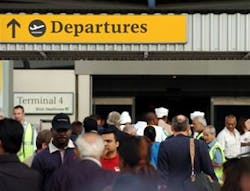British Airways Resumes Normal Operations on all British and European Flights
LONDON (AP) -- British Airways PLC said it was almost back to business as usual Monday as it resumed all scheduled domestic and European flights, but analysts said that the airline will not be so quick to shake off the negative effects of last week's ground-crew walkout.
The dispute, which grounded more than 100,000 passengers, was the third major incident causing cancellations to hit the airline in as many summers and comes as BA struggles with soaring oil prices and greater competition from low-cost carriers in Europe.
''The most important customer for BA is the business customer, the premium customer, and what they are looking for is reliability,'' said Henk Potts, an analyst with Barclays Stockbrokers. ''If they start to believe they can't get that at BA, that is a major worry.''
BA said Monday that fewer than 200 passengers remained stranded after last week's strike. The airline was operating all its British and European flights and 95 percent of long-haul flights.
''We're returning to normal,'' said spokesman Tony Cane.
But BA continued to warn customers that its flights would be operating with only limited catering facilities so travelers on longer flights would be provided with meal vouchers before boarding, a factor that analysts warn was likely to prompt so-called premium travelers - the airline's bread and butter - to book elsewhere.
Last week's strike, triggered by a dispute between catering staff and the U.S.-owned firm Gate Gourmet, which provides onboard meals for BA flights, stranded some passengers for more than four days. The walkout ended Friday.
Dresdner Kleinwort Wasserstein said that the cost of the disturbance at the peak of the summer season could be as much as 40 million pounds (US$72.4 million; euro58.4 million) - representing around 8 percent of forecast annual gross profit.
Last week's action followed disruptions in the past two summers. Last August, thousands of disgruntled vacationers were stranded at Heathrow after the airline canceled scores of flights because of staff shortages and technical hitches. In July 2003, an unofficial walkout by several hundred check-in staff disrupted thousands of passengers and cost BA tens of millions of pounds (dollars; euros).
Analysts said those repeated problems could overshadow the success of BA's recent restructuring and cost-cutting drive.
The airline began slashing costs a few years ago, cutting 13,000 jobs since the Sept. 11 terror attacks and rolling out self-service check-in facilities, in a bid to compete with low-cost carriers and deliver a long-term operating margin target of 10 percent. The operating margin is operating income divided by revenue, and indicates how much a company makes from each dollar of sales, before interest and taxes.
The strategy was appearing to pay off with the airline reporting just days before the walkout that its first-quarter profit more than doubled as the carrier saw higher premium-priced traffic. Unfazed by last month's bombings in London, BA said that passenger traffic in July rose 4.2 percent, with its key premium traffic up 6.8 percent.
Net profit for the three months ending June 30 rose to 90 million pounds (US$160 million) from 43 million pounds a year earlier. Revenue rose 8.3 percent to 2.06 billion pounds (US$3.7 billion).
However, like its competitors, the airline is facing rising fuel costs as its competitors as oil prices remain near record levels. BA said earlier this month that its annual fuel bill was likely to be 75 million pounds (US$133.5 million; euro107.66 million) more than previously thought. The carrier blamed the stronger U.S. dollar for driving its fuel costs up by around 525 million pounds (US$934 million; euro753.23 million) compared with the previous year.
BA has followed other airlines in raising surcharges on its ticket prices to help offset the rising fuel bills, a measure analysts say will not be appreciated by customers in the absence of a reliable service.
''Time and time again BA is being held hostage by unions,'' Potts said. ''BA needs desperately to work on its human resources and management between unions.''
Last week's walkout began when more than 660 Gate Gourmet staff - the bulk of the company's work force - were fired last week after an unofficial strike. BA baggage handlers and loaders represented by the same union as the catering employees - the Transport and General Workers' Union - stopped work in sympathy with the fired workers.
While the 1,000 BA ground-crew staff returned to work Friday, talks pressed on between Gate Gourmet and catering workers to resolve the dispute Monday. Gate Gourmet, which is undertaking restructuring amid financial losses, is owned by U.S. company Texas Pacific Group.
Copyright 2005 Associated Press
